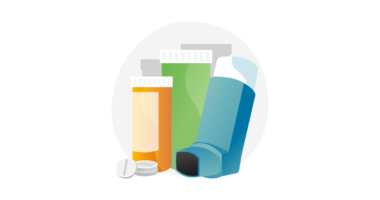It’s here! May is National Asthma and Allergy Awareness Month. We’ve got activities for you to take part in each week during the month to educate yourself and your patients, promote the specialty, and help drive patients to your practice. An easy place to get started is with our Asthma and Allergy Awareness Toolkit.
Week 1
- There are many reasons why you became an allergist/immunologist. Join the members of the College’s Social Media Subcommittee in their efforts to promote the work of allergists. We have a unique social media graphic to fill in with your own words. Post it on Instagram (or one of your other social media platforms) and make sure to tag the College (@allergy_acaai) and use the hashtag #WeAreAllergists.
- May 6 – 10 is Air Quality Awareness Week. Check out our 22-minute MicroCME module on the impact of climate change on allergic disease.
- The spotlight is on you this month, and media interviews are an excellent opportunity to educate people in your community about allergy issues. Pitch yourself as an allergy expert to local, state or regional media. Read our tips to help you get started. Use our free National Allergy and Asthma Awareness Month news release templates – we’ve written the release; all you need to do is customize it with your information and email it local media outlets. Most outlets have an email address on their website for story ideas and tips. If you have a local health reporter, look for their stories on the outlet’s website – there may be a direct link to contact the reporter in their byline.
Week 2
- Continue posting on social media! We’ve made it easy – use our ready-made social media posts.
- When you prepare allergen extracts, are you following the USP Chapter 797 guidelines correctly? Take our Allergen Extract Mixing Quiz to find out. You can also order USP 797 testing supplies to help your mixing staff document their compliance with the new guidelines.
- Have you seen our extensive collection of videos on our YouTube channel? You’ll find new videos where ACAAI members answer commonly asked allergy questions and also videos where patients share real-life experiences with eczema, asthma and chronic rhinosinusitis. These are great to show on monitors in your waiting room.
- Let primary care physicians know that partnering with a board-certified, fellowship-trained allergist can help their patients gain control over their allergy and asthma symptoms. Our Time for an Allergist Toolkit can help!
Week 3
- We have 20+ clinical webinars in our College Learning Connection (CLC) that College members can watch anytime for free. Topics include food allergy, vaccine immunology, anaphylaxis, asthma and more.
- In addition to National Asthma & Allergy Awareness Month, May also brings Food Allergy Awareness Week (May 12-18) and National Eosinophil Awareness Week (May 19 – 25).
- Take steps toward offering Peanut OIT in your practice. Our Peanut OIT Toolkit helps you prepare your practice for peanut OIT, have a shared decision-making discussion with patients, and bill for it correctly.
- Got just a few minutes? Our MicroCME modules take only 15 – 30 minutes and there are 12 modules dedicated to food allergy and GI disorders.
Week 4
- Your College membership gives you access to our toolkits on a variety of clinical and practice management topics. Each has up-to-date information and resources for you at no charge. This month, check out our toolkits on chronic sinusitis with nasal polyps, severe adult asthma, severe pediatric asthma and immunotherapy.
- Give your patients easy-to-read information on common allergic conditions. Share our popular online brochures with your patients in person, via your patient portal, or post on your website.
- Sharing your expertise as an allergist doesn’t have to end with National Asthma and Allergy Awareness Month! Consider hosting an asthma screening, possibly as part of a community organization’s health fair. As children go back to school in late summer or fall, it may be an ideal time to host one. Use our Asthma Screening Event Planning Guide to plan it.




